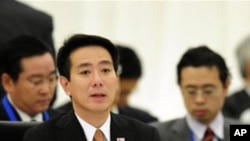APEC ministers vowed to curb trade barriers and eliminate protectionism on the final day of their two-day meeting. The ministers are laying the groundwork for discussions when their leaders gather in a few days.
Trade and foreign ministers from 21 APEC countries on Thursday extended their pledge to avoid new trade barriers in the next years.
The ministers vowed to complete the Doha round of World Trade Organization talks next year. The Doha talks are aimed at increasing global trade, especially for poor nations.
Japanese Foreign Minister Seiji Maehara said the commitment will would lay the foundation for future prosperity, at a time when the global economic recovery is slowing.
At a news conference, Maehara said the agreement Thursday shows APEC has played and will continue to play a critical role in the global economy. It reaffirms APEC's commitment to opening up Asia-Pacific economies to global trade.
APEC ministers also vowed to move forward with a larger goal of establishing a regional free trade zone involving all 21 member. The first step is a U.S. led trade agreement that eliminates tariffs in nine APEC countries in the next decade.
The Japanese government has been hesitant to commit, in part because of pressure from farmers worried an agreement would drive down their prices.
On Thursday, Maehara expressed strong commitment to the multi-lateral pact, drawing praise from U.S. Deputy Secretary of State James Steinberg. "We see this, the TPP initiative as a critical component of building this strong growth strategy for the future and welcome this expression of interest," he said.
That APEC growth strategy also calls for renewed focus on five different areas, including green jobs and new technology.
Maehara urged member countries to think of economic prosperity in broader terms, and stressed cooperation.
He says they are not looking for a zero-sum growth strategy. They want to create a win-win situation.
APEC leaders will now look to finalize the agreement when they gather here Saturday and Sunday. But political tensions between Japan and China could overshadow that summit.
The two countries have been locked in a heated debate since a Chinese fishing boat rammed in to a Coast Guard ship off disputed islands Tokyo controls.
Prime Minister Naoto Kan told reporters Thursday that a bilateral meeting with China would be up to Beijing. He added that China should show it is a country that carries out its responsibilities within international rules.
APEC Ministers Vow to Fight New Trade Barriers, Protectionism




